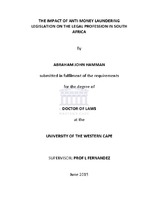| dc.description.abstract | This thesis investigates the legislative measures employed in South Africa to combat the implication of lawyers in money laundering schemes. Criminals make use of sophisticated technological means to transfer money and launderers routinely approach lawyers to assist them in their illegal endeavours. The legal profession is almost tailor-made for abuse by launderers, because lawyers work with huge amounts of money, clients are entitled to legal professional privilege and the right to legal representation is guaranteed constitutionally. The South African anti-money laundering regime, for the most part, is contained in two statutes, the Financial Intelligence Centre Act (FICA) and the Prevention of Organised Crime Act (POCA). Whilst FICA and POCA require the legal profession to be vigilant and accountable in the fight against money laundering, unfortunately they also infringe on hard-won rights, such as legal professional privilege, the right to legal representation and attorney-client confidentiality. The study considers South Africa’s efforts to fulfil its international anti-money laundering obligations whilst upholding the criminal procedural rights guaranteed in the Constitution. It is
suggested that certain sections of FICA and POCA fail to find the required balance
between protecting citizens from the harms of money laundering and protecting
the fundamental rights of attorneys and their clients. Lawyers are in a unique position of trust and in some instances have access to information that may incriminate their clients. Unfortunately, in its quest to combat money laundering, Parliament did not consider seriously enough the position of lawyers and took the easy option of criminalising fees paid with tainted funds, as well as the non-submission of suspicious transaction reports (STRs) and cash transaction reports (CTRs). As a result, the South African legal profession is saddled with unacceptable constraints. | en_US |

